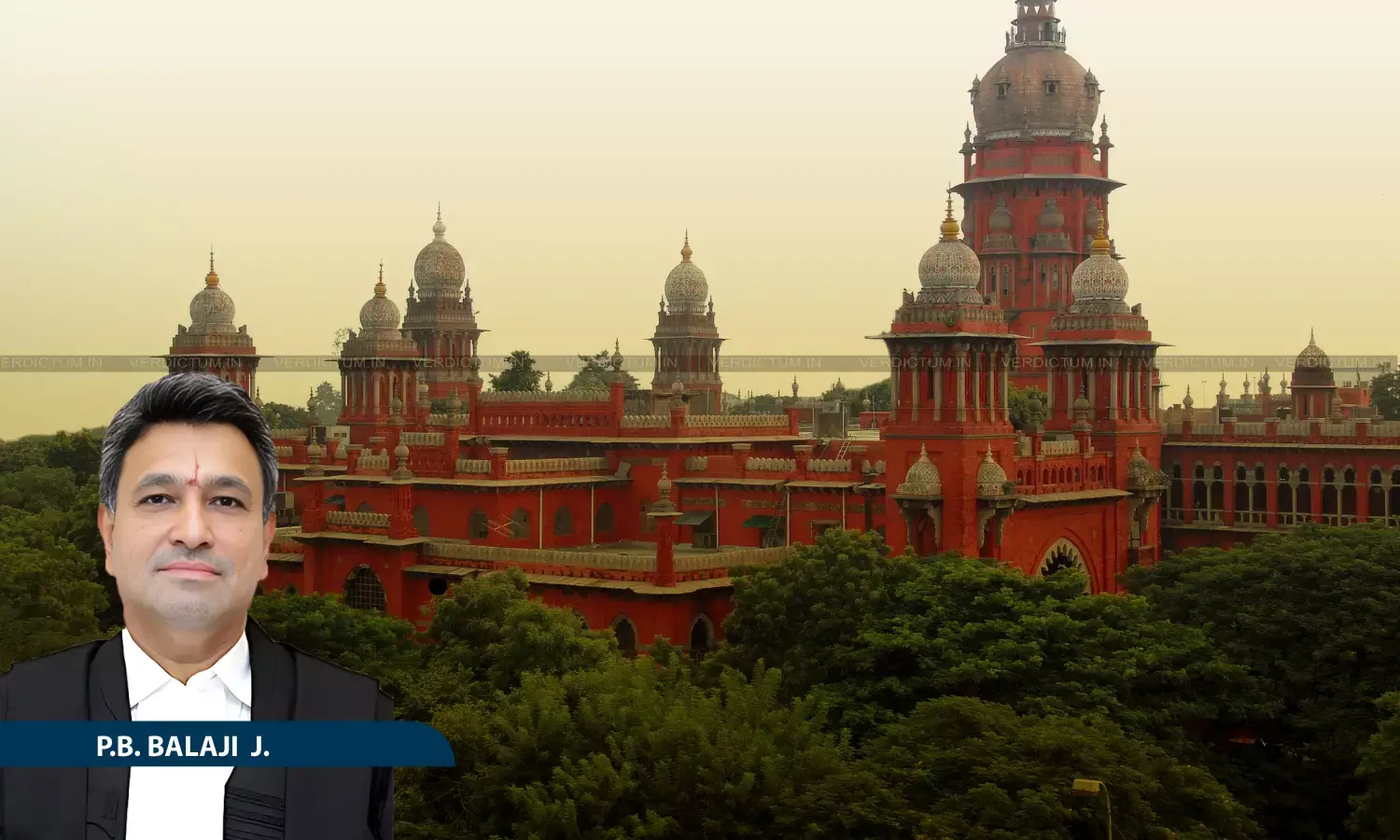No Street Is Unworthy Of The Chariot: Madras High Court Orders Temple Car To Enter Dalit Colony
The Court held that divinity cannot be confined by human prejudice and directed authorities to ensure that no form of discrimination prevents Dalit residents from participating in temple worship or festivals.

Justice P.B. Balaji, Madras High Court
The Madras High Court has held that caste-based objections cannot be permitted to override constitutional guarantees of equality and dignity, ruling that no street is unworthy of a temple chariot and no community can be barred from worship.
The Court directed authorities to ensure that residents of the Dalit Colony in Puthagaram village are allowed to worship in the Muthu Kolakki Amman Temple and that the temple chariot must pass through their area during festival processions.
The Court was hearing a writ petition filed by a resident of Puthagaram seeking a mandamus directing officials to permit members of the Scheduled Caste community to enter the temple, worship, perform rituals, and allow the temple car to proceed to the Dalit Colony during both the trial run and main run of the car festival.
A single bench comprising Justice P.B. Balaji heard the matter and noted that discrimination of this nature has no place in law or society. During the hearing, the Court observed: “Faith cannot be fenced by caste or creed and divinity cannot be confined by human prejudice. God does not reside in certain streets alone. No street is unworthy of the chariot or the god it carries. God never discriminates. So discrimination cannot be wrapped in the sanctity of tradition.”
Advocate S. Kumaraswamy represented the petitioner, while L. Baskaran and M. Murali, Government Advocates, represented the respondents.
Background
The petitioner, belonging to the Scheduled Caste community, alleged that caste Hindus historically prevented Dalit residents from entering the temple and barred the temple car from entering the Dalit Colony during the festival.
In early September 2025, when the Car Festival was announced, Dalit residents were allegedly stopped from participating in celebrations, prompting multiple complaints and peace committee meetings. The petitioner asserted that despite statutory duties, authorities failed to protect their constitutional rights.
By an earlier interim order, the Court had directed the District Collector to conduct a field inspection and report on whether the procession route could be extended into the Dalit Colony. The Collector, accompanied by the Superintendent of Police and other officials, submitted an integrated route map, confirming that the chariot could feasibly enter the Dalit Colony with minor road repairs.
Meanwhile, private respondents argued that the procession route had been unchanged for decades and altering it would lead to similar demands from others. They denied any caste-based discrimination and stated that Dalit residents were already permitted to worship and offer “Padayal” during festival rituals.
Court’s Observation
The Madras High Court first noted that Article 17 abolishes untouchability “not just in physical form but in true letter and spirit” and that “no one can dictate who is entitled to worship inside a temple.” Since the statutory respondents acknowledged that there is no prohibition for Dalit residents to worship, the Court recorded the statement and held that discrimination of any kind cannot be permitted.
On the temple car route, the Court held that objections based on past practice and speculation about future demands cannot override constitutional equality. Justice Balaji emphasised that religious tradition cannot be used as a shield to perpetuate caste-based exclusion.
The Court found that the existing route was not confined to four “Mada Streets”, as claimed, and since the District Collector confirmed feasibility after inspection, there was no valid ground to reject the extension.
The Court stated that when authorities find the extension technically practicable, and when it furthers equality and communal harmony, private resistance grounded in caste tradition cannot be sustained. The feasibility report, integrated route map, and official inspection satisfied the Court that the extension was workable without disturbing the festival’s character.
Conclusion
Allowing the petition, the Court directed:
• The respondents shall ensure that there is no discrimination in permitting the petitioner and his community members to worship in the temple.
• The chariot procession shall follow the integrated route suggested in the District Collector’s status report, including its passage into the Dalit Colony, during both the trial run and main run.
• The Police shall provide sufficient protection to ensure the festival is conducted peacefully.
Recording the integrated route map filed by the District Collector as a part of the order, the Madras High Court allowed the writ petition.
Cause Title: Selvaraj v. The District Collector, Kancheepuram & Others
Appearances
Petitioner: Advocates S. Kumaraswamy and D. Parventhan
Respondents: M. Murali and L. Baskaran, Government Advocates, N.R.R. Arun Natarajan, Special Government Pleader, Advocates G. Karthikeyan, R. Thirumoorthi


